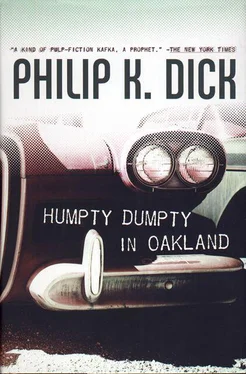“I want to see Mr. Bradford,” he said.
The woman leaned against the counter and tapped at her teeth with a yellow lead pencil. “You can double back for a mile or so and then get across. Or you can go on. Your subdevelopment is up the highway toward Petaluma, so you might as well go that way. They’re working all around there; you really should be careful. It’s easy to get lost.”
By bringing a map to the counter she was able to give him directions that he could make out. He thanked her and returned to his car, feeling new confidence. Maybe now, he thought. At least it did exist; she had recognized the name.
Once more he was in motion, and again in the area of construction work. The road became a tangle of dirt and asphalt, broken down, he decided, by heavy equipment; but it did cross the highway and he reached the far side, flagged by an old man in blue jeans, along with a group of other cars. There he was sent left along a pitted old blacktop road that followed the course of the freeway, but perhaps a mile to its left. On each side of him were orchards of dead fruit trees. He could not tell what sort they had been.
To his ears came the racket of machinery. Now he saw them, far off, like toiling insects. But he thought now, really thought, that he could see Marin Country Gardens; at least there was some sort of new housing development going up the side of a broad, brown hill. He could make out where the ground had been cleared, new narrow roads put in, foundations begun. Feeling buoyed up, he rolled the car windows down and let the warm summer air into the car, the dry country air, so different from the city’s. The smell of drying grass seemed satisfying and the sight of the flat fields gave him the absolute conviction that he had finally found it; the view which he now saw through his dust-and-bug-spattered windshield exactly fitted his expectations.
Now, to his delight, the sign itself appeared. As he passed he made out only the larger words; the information, painted on the wood in blazing green and red, dwindled row by row into facts about down-payments, floor-plans, number of bricks in the fireplace, colors. He read:
MARIN COUNTRY GARDENS
ONLY ¼ MILE AHEAD
OPEN FOR PUBLIC INSPECTION
This no longer was a State or Federal construction project, this area of dirt and machines ahead; this was a private business enterprise. And yet it fit in. It was part of the general stirring, the activity. All joined, and here his part entered; here he fit in. His wrists and hands burned with perspiration; he blinked and felt a new kind of feeling, or rather an old one, left over from his childhood. He yearned to spill from the car and get his feet onto the ground; he wanted to run and leap and grab up things to throw.
The road led to a small building with tar-paper roof and parking lot before it. A single dingy black Ford was parked there. The ground was muddy and trampled; he saw several rolls of roofing paper stacked up beside the small building. And a half-empty cement sack.
When he had parked and put on the handbrake—he made himself act methodically—he walked to the building with slow, easy steps. The door was open to an office in which a man sat behind a desk with his feet up and crossed. He was reading a paperback book. The office smelled of varnish. On the desk were a telephone and wire baskets of papers, and on one wall was a glossy calendar, new and crisp, with a print of a girl in a long flowered skirt.
“Greetings,” the man said. He turned the pages of his book as if discarding the unread part. Then he tossed it down on the desk, loudly, and folded his hands. He was young, with a long horse-face and thick hair. His suit was informal, single-breasted; his teeth projected and the skin of his neck was red and rough. Surprisingly, his socks hung in folds around his ankles. “You read these things?” he said, pointing with his thumb at the closed paperback book.
“No,” Fergesson said, panting with exertion and excitement.
The man picked up the book and regarded it. “ Brain Wave? he said. “By Poul Anderson. Science fiction. I read all these science fiction books. I must have read fifty the last month or so. The desk’s full of them. People give them to me; I don’t have to buy them.”
Fergesson, with his urgency, had arrived at this little closed spot of timelessness. The gigantic public works, protracted over decades, were unfolding close to this office and man; he had taken on their viewpoint. At his desk, with his heap of books, he was an Egyptian officer. Emotionless, cut off, he greeted Fergesson ponderously.
“No,” Fergesson said, wanting to bring the man back into motion, back into time. “Say, you know Mr. Bradford?”
The man nodded.
“Is he here?”
“Bradford isn’t here,” the man said. He rose to his feet and extended his hand, which Fergesson found heavy and dry. The man stooped from the low ceiling of the office and his height had gone into his shoulders. “My name is Carmichael. What is your name?” He asked it with a rising inflection, as if he had known it and forgotten it and expected to recognize it once he heard it repeated again.
“Jim Fergesson.”
“Hello, Jim,” Carmichael said, twisting his head on an angle and squinting. “Is that an Irish name?”
“I guess so,”.Fergesson said. He was calming now, feeling his blood pressure wane.
“Sit down, Jim.” Carmichael pushed a chair out and returned to his own chair facing across the desk. His two flinty hands rubbed together, upright, forming a vertical surface. Then, with his thumbnail, he tugged down his lip and pried at his gum. “Well, Jim,” he said. “What can I do for you? Can I sell you a house?”
“No,” Fergesson said, “I want to talk to Mr. Bradford. I have something to discuss. When is he here?”
“You do not want to buy a house,” Carmichael said. “I didn’t think you wanted to buy a house, actually. Mr. Bradford came out here once that I know of. Actually Bradford is part of the financial bunch that backs this place. The work is done by Gross and Duncan . . . contractors.” His voice slowed. “I represent the company. So you can talk to me.”
Fergesson had decided that he would not give himself away, that he would pretend to be something else and not what he really was. He really was here to see what had been accomplished; he was passing judgment on Marin Country Gardens and the work and schemes of its backers. In him was the capacity to decide, not merely about himself but about them all. And Carmichael was in on it because he was being decided about; he was part of the subdivision and the new shopping center, as were the workmen with the bulldozer and the man in the business suit who had backed the Pontiac, and, in a way, the policeman and the mailman and the real-estate woman and all the rest of them.
“I want to see what they’re doing,” Fergesson said. “Can we look?”
“Why not?” Carmichael said, making no move to get up. He seemed resigned and pleasant, but not particularly involved. “What line of work are you in, Jim?”
“Mechanics,” Fergusson said.
“What do you do, design or invent or make machines? You work with machines?”
“Cars,” Fergusson said.
“Do you?” Carmichael seemed interested. “I used to have a souped-up buggy I worked on. During the war I was in the C.B.s. I had some engine designs I worked up . . . mostly carburetor changes. Feed for each cylinder. That’s why I read this stuff.” He picked up his science fiction book and dropped it flat to the desk again. “You know, these guys who write these things . . . these rocket ships and time-travel machines and faster-than-light drives, all that stuff. If you want the hero to be on Mars you say something like—‘he turned on the automatic high-gain propulsion tubes.’ This one isn’t so bad but some of them are. They go barreling around the universe. It must be easy to write this stuff; they must bat it out.”
Читать дальше










